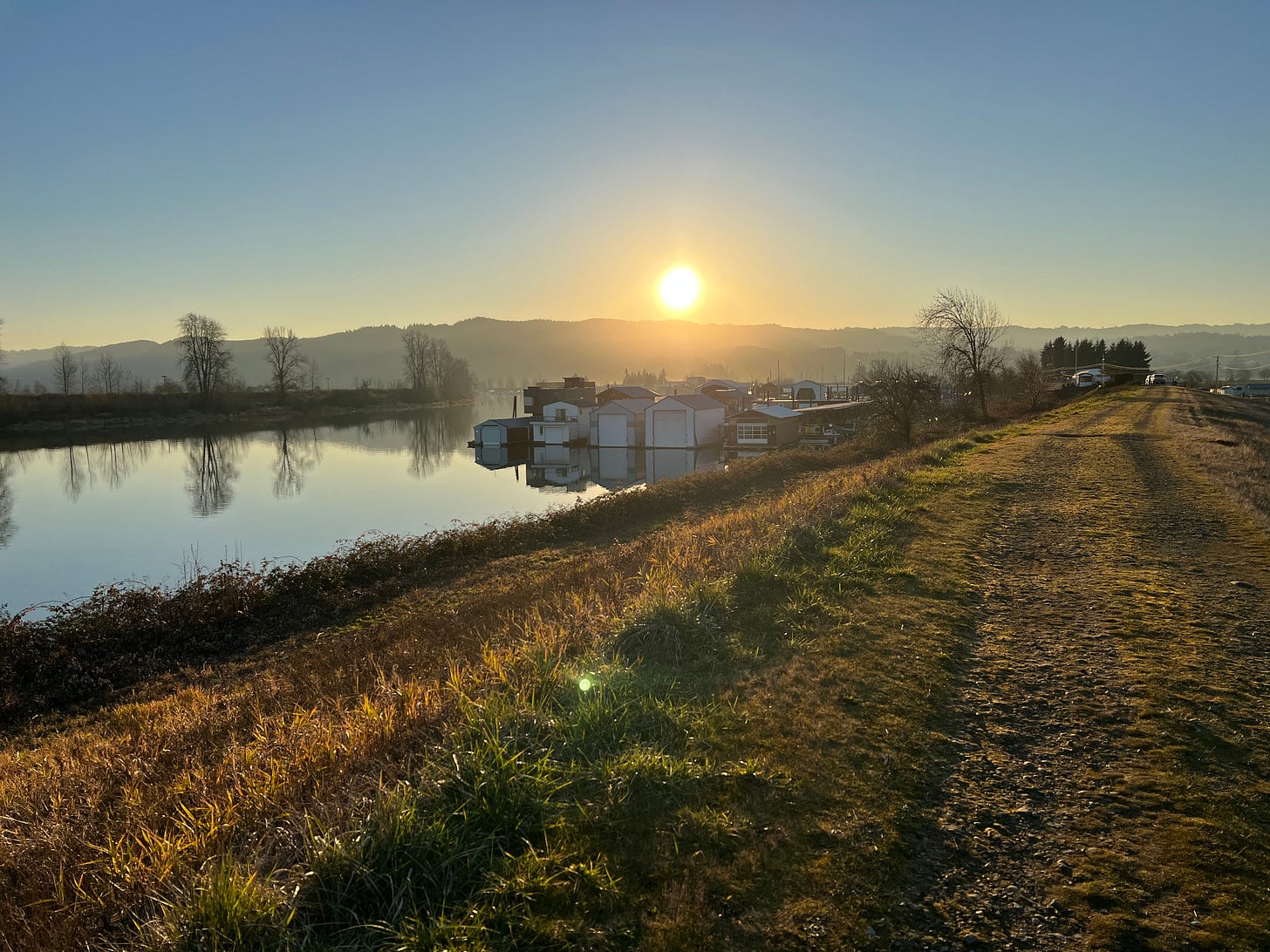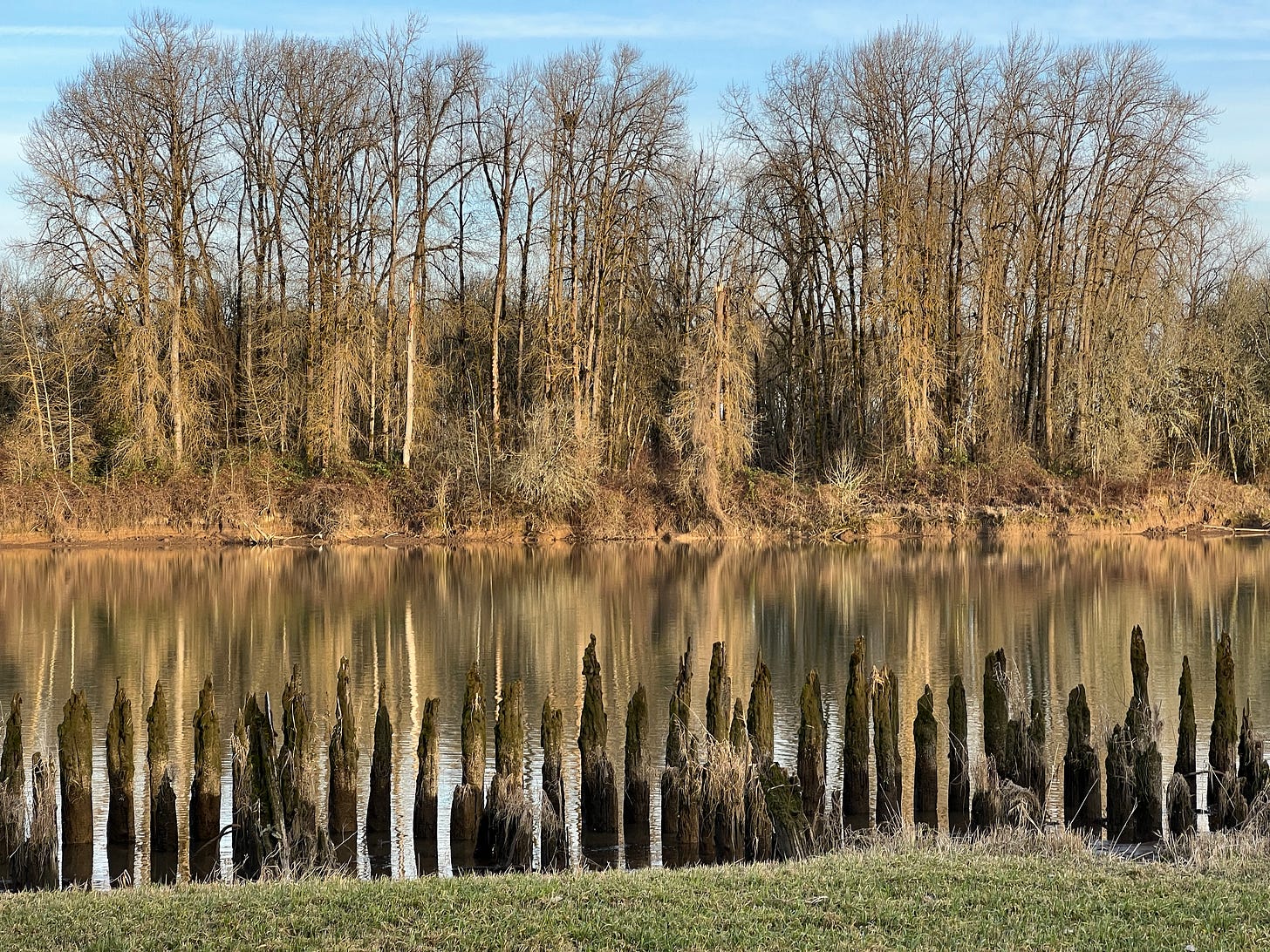my walking practice
An essay (first published in Deep Times Journal, March 2025)
The Great Turning is a prophecy that humanity will shift from an industrial growth society to a life sustaining one. Global warming and species extinctions are the result of millions of individual human decisions made through the last 400 years of industrial growth. Science suggests we do not have another 400 years to unmake what that mindset made. Fortunately, life sustaining practices are sprouting everywhere. I offer one such humble practice from the soil of my daily life.
For years I’ve lived by a walking trail that winds along the river where I live, and joins a trail built atop a logging railroad bed. Bordering farms and bird-rich wetlands, it eventually extends fifty miles into the Oregon hills. There is a coffee shop three miles in. Originally, I walked to the coffee shop as a daily morning exercise. Over hundreds of walks I’ve formed relationships with its other residents, particularly birds and trees. To keep these relationships alive, a walking practice developed itself inside me.
My unofficial stewardship of the path I walk did not develop out of intellectual urgency derived from what I know of my region’s ecological decay. Rather it has grown out of imagination and play.
When I walk alone in nature, I fearlessly entertain the notion that the world is magical and thought obstructs its sensation, and that sensation is the original way to meet it. My practice started as a combination of walking meditation which I learned from Joanna Macy in 1993, and Deep Listening which I learned from the modern composer Pauline Oliveros. The practice leaves no room for rumination because attention is full of the senses. When the mind is empty and senses are full, space for connections arise.
If you have legs, the walking part is easy. I recommend a quiet path, less travelled. When no humans are watching I love to dance down the trail in silly ways like a child. It breaks the monotony of a steady march. Be brave in tiny ways. Trespass the boundaries of your habits. Perhaps I get away with walking this way because I look to others like a harmless crazy old man. That’s okay with me.
Ears are the first sense organs formed in the womb. They brought us first evidence of another world when sounds arrived from outside our mother’s body. Similarly, hearing is the sense that opens me into a world of presence. Dzogchen teaches that sight, smell, taste and touch are equally powerful gateways to a clear mind. I’m most adept with sound.
Pauline’s Deep Listening means ‘listen to everything all the time’. It can be said simply but requires practice to accomplish. Try it: let your ears reach out into your surroundings and invite everything in. Follow each sound until it leaves you, especially sounds that persist. For example, keep listening to motors and wind while accepting all the shorter sounds.
If your mind prefers to spin stories in your head, don’t worry. The world must be what it is, including wandering minds. Denying a mental condition just makes more mental noise. Let each bubble of thought go without scolding yourself. When I’m stuck inside my head I use a trick I adapted from the WTR practice called the “Mirror Walk”. I imagine the emptiness of the universe ‘before’ the Big Bang and then open my eyes to the astonishing endlessness of what is. A primal reset, it shocks my mind enough to let my senses rush back in.
I live on a boat on a river that glides through wetlands between manmade dikes. The river is rich with salmon and sturgeon, cormorants, ducks and more. The wetlands throng with geese and cranes. This river is ancient and alive.
The water has long been unsafe to drink because of industrial pollution and run-off from farms. Only once in my life, on the Katherine River in Australia, did I have the pleasure drinking river water right from the canoe. For tens of thousands of years humans enjoyed this global gift. What is it that I take for granted now which will be gone for future generations?
My walk starts on the dike. Until this year trees on the dike offered homes for bird families and tall grasses for rodents. But those thriving volunteers were not planned by the Army Corps of Engineers, who had it all cut down, they say, for our safety. I miss their beauty and grieve when I see only stumps and slash.
Un-homed birds on powerlines wail. Wail for the suffering we have caused. My gut awakes my heart in alarm. I listen again and hear joy. How can that be? How can songs of pure joy emanate from breasts beaten down? I listen again… they are not beaten down. Birds are tough little beings that deserve respect, not pity or derision. How they survive night after night of cold rain and wind is impressive. They are bright-eyed warriors and Bodhisattvas.
It feels odd to be an invader species responsible for massive extinctions and genocide. I do not identify as a species that could end all life with its weaponry and yet has the gall to fear “wild trees” and kill “invasive plants”. Like it or not, I am an invader. I am a poor human. Pity the old white male.
The dike makes for excellent walking, with views of the sparkling river. Seven kinds of geese vee overhead, headed for their homes. Many survive hunting season. Each morning the gunfire starts early. I’m certain there are days when some geese lose no family members, gunned down for sport. The state provides more than 10,000 acres of wildlife area across the river. Terror is the price they pay to make it home.
I love the sandhill cranes and have entered a magical connection with some of them. Once one slowly circled over me calling down. I called back up. I swear we renewed loving vows we made in other lifetimes. Call it fantasy. I don’t care. Let tenuous make-believe sow ecological responsibility if that’s what it takes. I suspect such magic touches us all but usually slips off like Teflon. As I stepped away from where I stood beneath the crane I caught my rational mind stomping on its memory. That exchange was close to being erased but survived. My heart feels like a river when I hear cranes.
A mile from my gate there is a pocket of wood where “wild trees” grow elegant and tall, and the underbrush thick and various. My little city recently designated as a park. I go off trail and descend to it from the dike. I always ask for permission to enter, out loud. In my quiet state, I simply wait for a reply, sensing the bliss of leaves absorbing sunlight and roots’ deep suck of soil. Sometimes the reply is a pretty birdsong, or commentary from a crow. Sometimes I feel the area does not welcome me though I usually make an offering.
Inside I found a place by a big spherical bush where, unseen, I could make offerings. My offerings are music. Typically, I hold a tin whistle and silently listen for what music might fit in. I often improvise on Irish sean-nos airs. November through March the silence is punctured with sporadic gunfire. My whistle’s cry spreads far and wide. Curious walkers on the dike stop to see who or what is making this ‘flute music’. It echoes across the river and into the wilderness area. Lone hunters put me in their scopes not to shoot but to see where music is coming from. Ospreys circle and Bald Eagles launch from their aeries. Kingfishers scold. Playing music is my way of offering beauty back. Often, I’d turn to the flowering bush and play for it alone.
One week not long ago the scrub and underbrush fell under a bulldozer’s blade. I feel shock when I stand where my favorite bush once thrived. Now it’s a place I go to grieve. How can I stand by as the natural world is destroyed? So what - it’s not old growth but just a scrubby riverside patch. Feeling the pain, I sit with it, imagine its shape, and search for where it lodges in my body. Must progress always render me powerless? I did not stop the destruction.
I could not stop the destruction. The men who operate the machines are friendly people ‘just doing their jobs’. Apparently, the city has opted to shape this place into a standard style of park with sprawling lawn and shade trees, rather than rambling wild woods. Families of voles, moles, and nutria, of birds and foxes were killed or exiled. I’d prefer knowing they’re there to seeing pretty green grass. (While writing this essay I scanned the city’s park plan and discovered I know the VP of the parks committee. I shall contact her in the hopes she can hear their cry.)
The trail turns onto a paved railroad bed, lined with stately trees. Further along, blackberries are brutally cut back. Herbicides are sprayed to make the ground look neat and clean and cheaper to ‘maintain’. Who dares poison the source of our food so weeds don’t grow? I prefer the disorderly riot of weeds.
I listen as I cross the wetlands. As far as I can tell, all those who sing love to sing. All those who croak love to croak. All those who whisper in secret, love to whisper in secret. If it’s so quiet that nothing comes - then I become what nothing loves - and if I can, love that.
Two miles in, a local airport runs constant take-offs and landings of little planes louder than Harleys and as irritating as airborne gas-powered leaf-blowers. Maybe I’m cranky, but sunny days are so loud with noise it masks the melodies of birds, frogs’ croaked rhythms, and the ostinatos of ducks and geese. Thankfully on drab and rainy days the planes fly less and a lovely quiet hush leaves room for the whole symphony.
Further down and closer to town was a 5 acre stand of 150 foot tall Douglas Firs. It was probably a stand that was grown to be harvested. It took weeks for every grand being to be mechanically uprooted, limbs severed, and ground into chips. Even the topsoil was hauled away. The naked subsoil sits waiting to be sold as an industrial park. This is called progress, the endless maw of making money. We do not have to live this way.
Finally, I leave the trail and walk a few city blocks to the coffee shop. I drink oils from beans grown in Indonesia. Delicious and energizing, but is it worth what I pay? I’m not talking money here. I give in and look away. At my comfortable seat I open my laptop to work, thinking that all the life I met that morning, somehow I betray. I lift my cup, stare out the window and close my eyes. I recall the “Mirror Walk”. I imagine the emptiness of the universe ‘before’ the Big Bang and then open my eyes to the astonishing endlessness of what is.




I’m a fan of the articulate descriptions of your emotions!
Thank you 😊